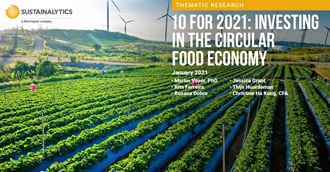Applications of Country Risk Ratings in Fixed Income Investing
How are Country Risk Ratings being utilized to identify risk and to construct a sovereign ESG fixed income index? Listen in as Manna Neghassi, Manager, Product Strategy and Development at Sustainalytics and Katie Binns, Senior Product Manager, Fixed Income Indexes at Morningstar Indexes tell us more.
Is the COVID-19 Pandemic Threatening Progress on Gender Equity?
The COVID-19 pandemic has disrupted lives and livelihoods on an unprecedented scale. Despite massive government spending, the pandemic resulted in the global economy shrinking by 3.5% in 2020.[i] However, the financial burden of this pandemic has not been borne evenly.
Enhancing Risk-Return Profile by Combining ESG Risk and Economic Moats
Hear from Sustainalytics' Methodology and Portfolio Research specialist, Liam Zerter, as he talks us through the key findings from Sustainalytics' recent Combining ESG Risk and Economic Moat report, which shows that economic moat and ESG risk can be combined to create investment strategies that generate value both in terms of returns and portfolio risks.
Five Commonly Asked Questions About Sustainalytics’ Approach to Impact
We launched our new Impact Metrics product to support investors’ growing need for more robust data that can be used to demonstrate how ESG-focused strategies can deliver real-world social and environmental outcomes. Since the launch, I have connected with many enthusiastic institutional investors eager to make sense of the rapidly evolving world of impact, excited to dive into impact data, and cautiously optimistic about supporting their clients’ Sustainable Development Goal (SDG) and impact needs.
EU Sustainable Finance Disclosure Regulation: An Update
Update - 3 March, 2021: To help investors comply with the new requirements of the SFDR, Sustainalytics launched the PAI Data Solution that maps our research to the 60 indicators defined by the regulator. This new dataset will enable investors to consider the PAIs in their investment decisions as well as supporting disclosure requirements. Visit our website to learn how we can help with you SFDR compliance journey.
10 for 2021: Investing in the Circular Economy
This report aims to support investors interested in gauging environmental, social and governance (ESG) risks and opportunities in the global food value chain. We survey key subindustries – from agrochemicals, agriculture and aquaculture to packaged food, food retail and restaurants – in search of solutions that may support the principles of the circular economy (CE). These principles include minimizing waste and pollution, extending the use-phase of products and ecosystem regeneration. Some of the key insights found in the report are:
Lessons Learned from 926 Engagement Meetings in Emerging Markets
When Sustainalytics (GES[1]) initiated the Emerging Markets (EM) Engagement program as a pilot project in 2009, the scale, scope and impact were undetermined factors. Based on the successful execution of the program methodology in the African and Middle Eastern regions during the pilot stage, the full program launched in 2010 to cover all major emerging markets. After the project close in July 2020, the program accounts for 926 meetings with companies in emerging markets.
A Political Pivot for Climate Change and the American Coal Industry
As the Biden administration moves into the White House this week, the world is waiting to see if a promising focus on climate change along with a Democratic Congress will present plausible opportunities to cut carbon emissions. While the outgoing administration backed initiatives supporting coal energy[1], it doesn’t appear to have slowed industry decline.
Is Natural Gas a Cleaner Energy Solution?
While Oil and Gas (O&G) operations are responsible for roughly 15 percent of global energy-related GHG emissions, some energy companies have pledged the role of natural gas (NG) as a transitional fuel. At the same time, NG energy use is increasing globally, and shale-gas extraction is booming at an unprecedented rate. One factor that is often overlooked is the methane emissions across the NG value chain.
Combining ESG Risk and Economic Moat
In this report, we look at the potential synergies between Sustainalytics’ ESG Risk Ratings and Morningstar’s Economic Moat Rating. As a part of our research, we constructed a back-testable investment strategy and portfolio by segmenting stocks with low ESG risk and a wide moat. While both metrics worked independently, they performed exceptionally well in combination.
Integrating Climate Risk into Corporate Governance
Since the introduction of the Taskforce on Climate-related Financial Disclosures (TCFD), there has been increased scrutiny of corporate climate governance and broader associated risks. Investors have increased their focus on climate risk, as governance mechanisms are likely to be impacted by transition and physical risk challenges[i].
How Climate Gentrification is Increasing Real Estate Costs and Socio-economic Disparities
Climate gentrification is an emerging concept describing how land with greater resiliency against intensifying physical impacts of climate change becomes more desirable and valuable.[1] It catalyzes fast and visible socio-economic transformation in communities.
ESG Risk Ratings Methodology
The ESG Risk Ratings measure the degree to which a company’s economic value is at risk driven by ESG factors or, more technically speaking, the magnitude of a company’s unmanaged ESG risks. A company’s ESG Risk Rating is comprised of a quantitative score and a risk category.
Prioritizing Patient Care and Staff Safety in a Pandemic
Medical facilities, including hospitals and long-term care facilities, are under tremendous pressure to provide quality healthcare for patients while ensuring patient and staff safety amidst the COVID-19 pandemic. By using Sustainalytics’ ESG Risk Rating to understand better the risks faced by companies, and the current state of preparedness within the medical facility subindustry, investors can identify the most relevant points to address when engaging with companies and analyzing potential ESG impacts in their portfolios.
Sustainable Finance Disclosure Regulation: An Industry Game-changer
In recent months, the Sustainable Finance Disclosure Regulation (SFDR) has been sparking almost as much debate as the EU Taxonomy – both cornerstone regulations of the EU Sustainable Finance Action Plan. With the SFDR set to redefine ESG disclosures and make a significant impact on financial market participants in Europe, the short timeline and ambiguity on several vital details are creating confusion and concern in the industry. The risk of organizations not being able to comply in time is still present, despite the announced delay in timelines for the technical standards, as is the risk of high financial and operational costs for the industry.
A Pipeline for Strategic ESG Risk Mitigation
Given the ESG impacts often associated pipeline projects, it is reasonable to say that pipelines have been a source of controversy in North America and around the world. In 2020 alone, several major pipeline projects face high levels of public and community-based opposition; with consequences including widespread protests (as was the case for TC Energy’s Coastal GasLink project at the beginning of this year) and large-scale regulatory and legal challenges (as seen currently with the Dakota Access Pipeline).


.tmb-thumbnl_rc.png?Culture=en&sfvrsn=881ecd4b_2)
















